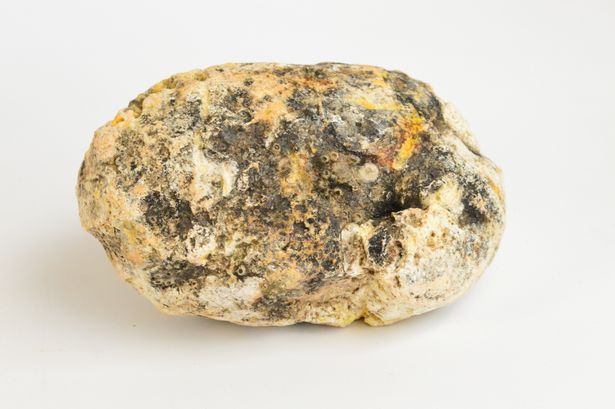A Whale of a Discovery

Pictured above is what one could easily mistake for a rock. It looks like a rock. It’s about the size of of a cantaloupe and, at just under two and a half pounds, it’s about what one would expect a rock to weigh. And it was even found on a beach.
But it’s not a rock. It’s something called “ambergris,” and it’s worth a lot. As in, about $6,500 per pound.
Ambergris, as National Geographic explains, has long been a key ingredient for those who sell high-end perfumes — companies like Chanel — because the substance has “the ability [ . . ] to fix scent to human skin.” Basically, perfumes don’t last forever — over time, their strength fades. But the perfume’s scent doesn’t just fade evenly over time — the odor actually changes as the hours tick on by. (Anyone who has used cheap cologne has unfortunately experienced this at the end of the evening.) Ambergris contains a chemical compound which causes the perfume to fade evenly, maintaining its scent. As a result, demand for the rock-like item above is pretty high.
In fact, ambergris is so valuable that we’re willing to ignore the fact that it was either vomited or pooped out of a whale.
We’re not quite sure which end of the whale the item regularly comes out of, but either way, the “rock” above originated from somewhere inside a sperm whale. It was likely the result of a bile duct secretion into the whales intestines, although science isn’t quite sure of how or why it’s made. Ambergris is often found with bits of squid beaks mixed in, which leads to the prevailing theory, as articulated by Scientific American:
Ambergris originates in the intestines of male sperm whales after they dine on squid, whose hard, pointy beaks abrade the whales’ innards. Scientists believe that the whales protect themselves by secreting a fatty substance in their intestines to surround the beaks. Eventually the animals cast out a huge lump, up to hundreds of pounds at a time.
Despite these hundreds-of-pounds emissions, ambergris is actually very rare. There are multiple reasons why. First, there aren’t a lot of sperm whales out there — maybe a few hundred thousand, down from over a million a century ago. Second, not all sperm whales produce ambergris. And finally, once ejected into the ocean, the substance may break up into too-small bits for people to find. So supply is pretty low.
On the plus side — at least if you’re treasure hunting — ambergris smells pretty strongly, which means you won’t mistake it for a rock. Depending on when it was expelled from the whale, and from which direction, it may smell like whale poop, which is to say not so good. If it’s been floating around for a bit, it smells a lot less awful but still very distinctive; Wikipedia describes it as having a “sweet, earthy scent commonly likened to the fragrance of rubbing alcohol without the vaporous chemical astringency.” So on occasion, people on the beach (often walking dogs) come across an item which looks like a rock, is heavy like a rock, but smells like, well, not a rock, and they end up with a nice payday. The 1.1 kg/2.4 lb hunk of whale excrement pictured above, for example, sold at auction to a French perfume house in September of 2015 for £11,000 (about $16,000).
But don’t go beach-combing for whale poop just yet. First, selling ambergris is illegal in some areas, in an effort to prevent whaling (one can take ambergris from a whale by force). Second, the intrepid scientific community has created a synthetic version of ambergris (although some fragrance companies still prefer the real thing, even at the costs involved). And third — and perhaps most importantly — not all smelly, rock-like stuff on the beach is worth a small fortune. In 2013, a British man found a large, smelly rock-sized thing. He and some experts thought was a seven pound hunk of ambergris which could have been worth north of $100,000 — but two years later, it turned out to be worthless.
Bonus fact: The typical sperm whale’s brain weighs about 17 pounds (7.8 kg), which is larger than any other animal’s. It’s brain is about five times heavier than a typical human’s.
From the Archives: Sleeping and Breathing: Whales (and dolphins) are mammals — they breathe air — and yet, they sleep in the ocean. How do they keep themselves from drowning as they doze? Here’s the answer.
Take the Quiz: Name the really big whales.
Related: “Floating Gold: A Natural (and Unnatural) History of Ambergris” by Christopher Kemp. 36 reviews averaging 4.5 stars.
